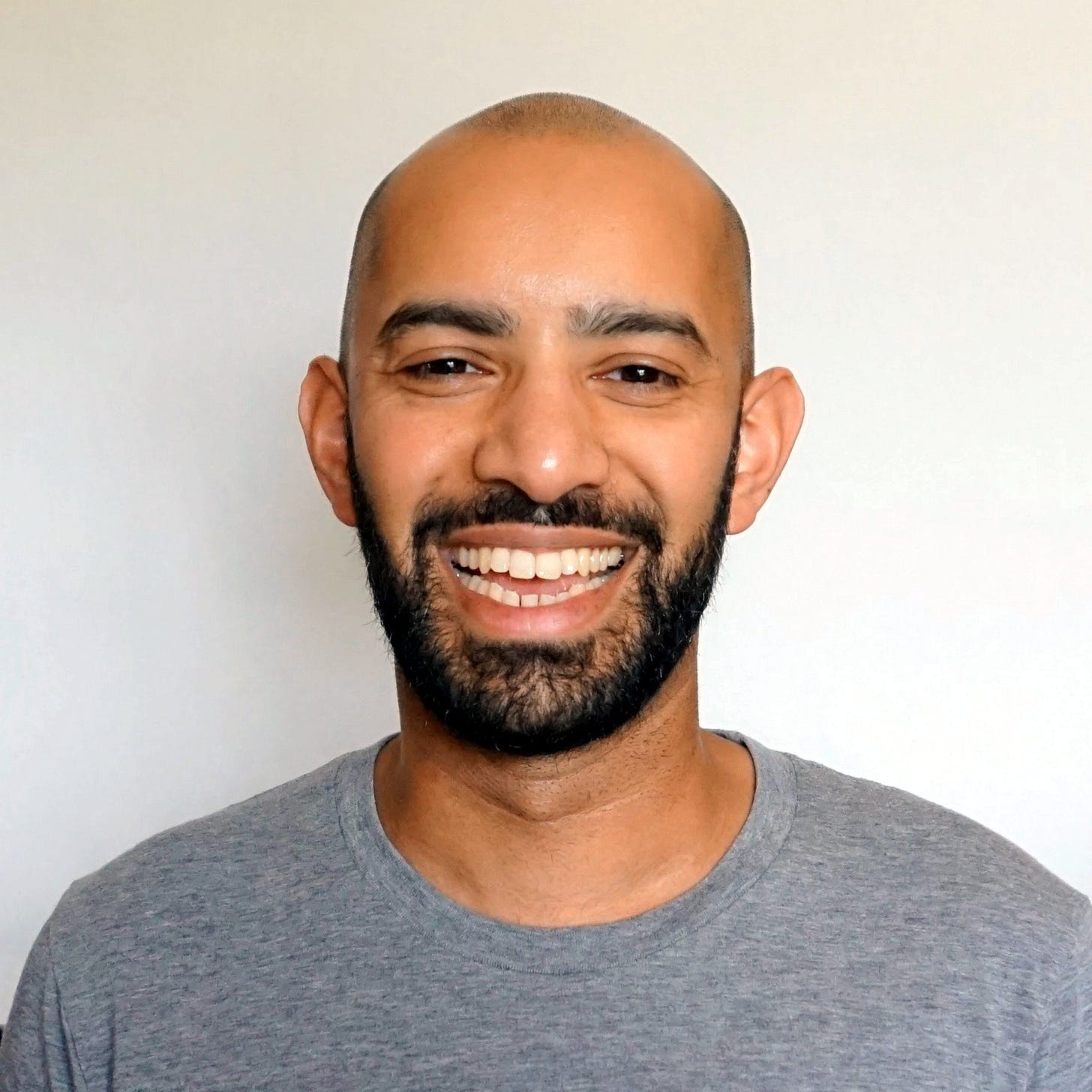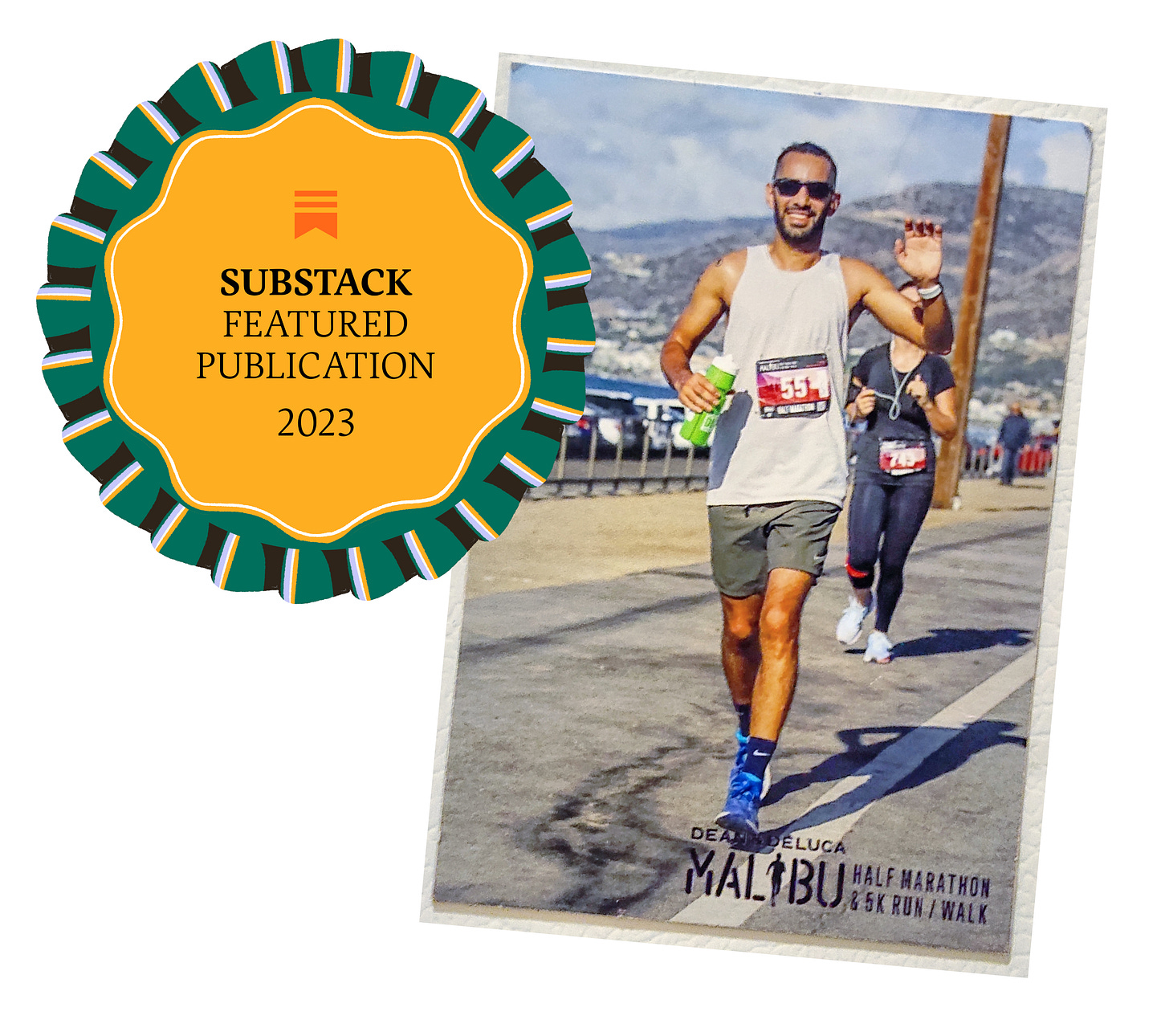Running Sucks
5 questions with Raz Rauf about writing, running, and place.
I love the sociability of sport. And not just team sports. Running, climbing gyms, cycling—these activities easily include other people. Some of my best friendships are horizontal, defined by side-by-side shuffles with conversation unfolding across parallels of motion.
I’m certainly not the only one who makes friends this way. According to The Survey Center for American Life, nearly seven in 10 Americans have situational friends or place-based friendships—people they see in places like work, school, or the gym. Over half say they have ‘activity friends,’ whom they join in events like sports, hobbies, worship, or community service. We’re social animals, but often need a complex of space and structured interaction to develop relationships.
That’s why I’m delighted to share a short interview with Raziq Rauf, writer of Running Sucks, a series of stories about interesting runners from around the world. Raz features individuals, but his conversations often explore the communities these runners have built around themselves.
Rauf, who’s based in LA, has a copywriting and journalistic background with bylines in the BBC, The Guardian, and NPR. But his passion is telling the stories of seemingly everyday people doing extraordinary things.
Without further ado, here are 5 Questions with Raz.
1) Before we jump into Running Sucks, tell us how you made your way into the sport. How did that evolve into the desire to learn about the people who make up the pack?
I was on the track team at school and also ran cross country, but that was less to do with being ‘good’ at running and more to do with being less good at team sports. I wasn’t a naturally athletic child. It follows that I did very little physical activity at university.
Cut to my early 20s and I was a music journalist in London becoming increasingly unhealthy, so I took up running again. This time it became a personal practice. The time I spent running was the only hour of the day where I wasn’t listening to or writing about music. It was a quiet place that allowed my mind to breathe.
Eventually, I stopped writing about music — but didn’t stop writing or running. I found that I missed the characters and creativity from the music world. I realized that those stories could be found in running, and so I set about meeting as many amazing people from the running world as possible. (I think runners are actually more unhinged than rockstars, haha!)
Just as running was a personal practice, so was writing about it.
2) How has your writing process evolved with Running Sucks?
This started primarily as an exercise in journalism. I wanted to speak to interesting people who are expanding running culture and flex some writing muscles that had maybe lain dormant for a few years. This scratches that itch for me, but I always remember that I have to scratch the reader’s itch as well.
When I’m battling 100 other emails in a reader’s inbox, I have to make the newsletter captivating in a way that they’ll look forward to seeing my name every week. Part of that is making sure I write about interesting people and have a good angle, but I also try to break up the text with pertinent sub-headlines and images.
As you well know, it’s a fun game when you’re 100% of the publishing team.
“When work-life boundaries are blurred to that extent, a social club or activity is of paramount importance.”
3) You've now published many interviews in Running Sucks. What's one that made you rethink your relationship to the sport?
It was quite early on. One of the questions I ask is: ‘What part of running sucks the most?’ I was taken aback when one subject told me quite firmly that running doesn’t suck.
For me, the difficulties I face while running help me build resilience and test my strength. Running is like a diagnostics test for both my body and mind. Accepting, and even leaning into, the sucky parts of running (rather than denying it) is maybe the most important part for me.
When I came up against that friction, it made me rephrase that concept of running sucking for future interviews.
3) There is a sense of ‘placed-ness’ in many of your interviews. For example, you recently described the Venice Run Club in LA as more than a gathering of people, but a ‘third place’ of social infrastructure where people can gather in serendipitous ways.
Why are third places important?
Third places have long been the bedrock of society. We’ve long known of the importance of work-life balance, and I believe that balance is best achieved in those places where we are free of family and colleagues. It’s a place to take a break from those things. A little bit of space.
I think it’s easier for people to achieve balance when they have an understanding of these geographical or sociological concepts. Nobody’s figured the world out completely, but let’s get as far as we can.
Recently, there has been much talk of loneliness — in part caused by the pandemic and the increased number people working from home. When work-life boundaries are blurred to that extent, a social club or activity is of paramount importance. I’ve been a freelance writer for 15 years now, and I joke about needing to go to a concert or run club to socialize myself for the day. Like you would a dog.
5) Finally, give us some book recommendations. What are two books you recommend?
I like reading noir fiction and autobiographies. Recently, I’ve read the third book from Craig Clevenger, Mother Howl. After writing two fantastic novels in the first few years of this century, there was an 18-year wait for this one, and it didn’t disappoint.
The running book I’ll recommend is There Is No Wall by Allie Bailey. It’s a tale of depression and addiction, told with humor and honesty. Back in the second week of January, I said it will be the best running book of 2024, and I stand by it!
Here are some of my favs from Raz:
Musing on capitalism and running with Atlantic CEO Nicholas Thompson
On stillness and creativity with Semi-Rad’s Brendan Leonard
Running topless to combat the stigma of mastectomy with Louise Butcher
Read more from Running Sucks:
Upcoming events
In the spirit of third places, here are some in-person and online activities of interest:
Reflect Forward workshop. Prepping for a life change? Olympic Trials Qualifier Bridget Zapata is hosting a free workshop designed for anyone planning for the future or feeling stuck. I did the workshop early this year and loved it.
April 11, Zoom.Weekly run. Breakfast Club meets every week in person for an 8-mile run from Lake Temescal in Oakland. Pace averages around 7:00 to 7:40 per mile with coffee afterwards. Email Katie Klymko at katieklymko at gmail.com to join our group run WhatsApp chat.
Thursdays, 6:30AM, Oakland.Substack San Francisco Writers Meetup. I’ll be at this informal confab of internet writers at Heartwood bar near Montgomery BART. Technically, the event is for writers on the newsletter platform. Maybe that means you should start that creative passion project you’ve been thinking about?
April 22, San Francisco.
Tweets of the week
Parting thought
“Through the solitude of rare spirits, the collective renews its relationship with divinity.” — William Deresiwicz











Love Running Sucks for the fascinating runner profiles and insights into running cultures. Also Raz is really funny.
Big fan of Raz :)